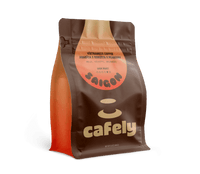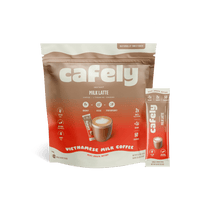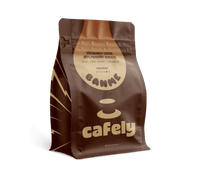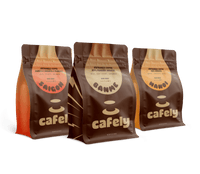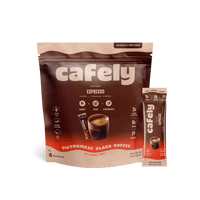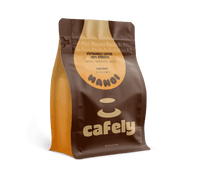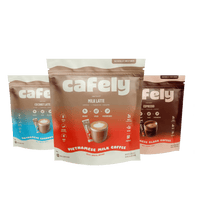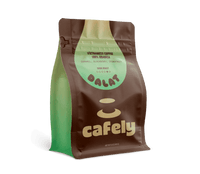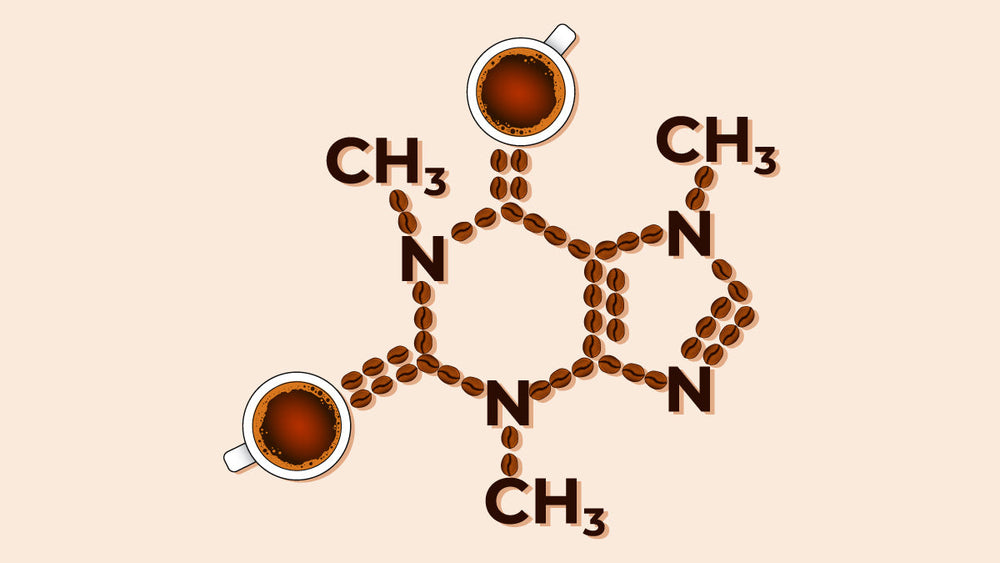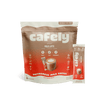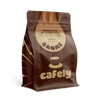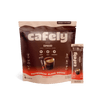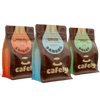Coffee is known for being mildly bitter, offering notes of chocolate, chestnut, citrus, and tropical fruits. However, too much bitterness can be unpleasantly “dry” and harsh.
Has your coffee suddenly taken a turn for the worse? Or is it simply too bitter to be enjoyed? Let’s look at 6 reasons why this happens, along with practical tips to return to a smooth, delicious (and, yes, slightly bitter) cup of coffee.

Why is My Coffee Bitter?
Coffee is naturally bitter due to a series of chemicals called chlorogenic acid lactones. In nature, bitterness is associated with toxic substances produced by plants, fungi, and insects to prevent animals from accidentally ingesting them [1].
Humans have learned to overcome and enjoy slightly bitter notes especially if ingesting the plant, seed, or fruit results in stimulation or altered perception (like coffee). With that said, most people don’t enjoy overly bitter foods.
The bitter flavor is an important part of coffee, as long as it doesn’t overpower the sweet, sour, floral, and nutty notes of the brew.
While caffeine and chlorogenic acid lactones contribute to a brew’s bitterness, there are around 30 different compounds responsible for the bitter flavor of coffee. How the coffee is prepared can enhance these compounds and make the resulting brew too bitter to enjoy.
Here are the most common causes of bitter coffee and what you can do to prevent them:
1. Over-Extraction
Over-extraction is one of the primary causes of bitter coffee. Over-extraction is when you take “too much” out of the beans, causing the brew to become bitter.
Extraction is where you combine hot water with roasted, ground coffee beans to draw flavors, acids, oils, and other components from them. Oils, fats, and acids are the first extracted components, followed by sugars.
The bitter tannins are the last to be extracted. These components are drawn out as the fibers of the ground coffee beans begin to break down.
For the perfect cup of coffee, you want to extract just the right amount of each component, but stop before the fibers break down and release the bean's bitterness.
Here are the 4 main causes of over-extraction and how to prevent them:
- Brewing time is too long — A long brewing time allows the fibers of the beans to break down, releasing their bitter compounds. If your coffee has taken on an unpleasantly bitter taste, start by reducing brewing time. Even 30 seconds less can make a difference.
- Coffee is ground too fine — Water percolates slower through finely ground coffee and this prolonged exposure extracts more bitter compounds. If you grind your own coffee, avoid over-grinding and adjust the grind to be coarser. When buying pre-ground coffee, elect for a “medium” or “coarse” grind.
- Wrong coffee-to-water ratio — Adding too much or too little coffee during brewing affects the extraction process and can often lead to bitter coffee. There are many recipes for the perfect cup of coffee, but if your coffee is bitter, follow the National Coffee Association’s ratio of 1-2 tablespoons of coffee for every 6 ounces of water. The ratio can be adjusted from here to suit your palate.
- Water is too hot — Boiling water can “scold” the beans and make your coffee bitter. The ideal water temperature for making coffee is between 195 °F and 205 °F (90.5–96 °C). If you don’t want to bring out the thermometer every time you pour yourself a cup, bring the water to a light boil, turn off the heat, and allow it to rest for one to two minutes.
Water quality is also important. Poor-quality water contains compounds that may interfere with the extraction process and affect the bitterness of your coffee. If tap water isn’t working, try using filtered or bottled water to brew your coffee.
2. Coffee Type
There are many different types of coffee beans, and some are naturally more bitter than others. You might find your coffee has an unpleasant flavor because the beans you are using are simply not right for your palate.
If you find your brew bitter, you might want to try:
- Choosing arabica beans — Arabica beans are typically less bitter than other coffee varieties, such as Coffea robusta and the more tannic liberica variety.
- Sourcing high-quality beans — Low-quality beans may be more bitter due to poor post-harvesting processing and roasting practices. Source your coffee from reputable sources and only use freshly ground beans for the best cup of coffee.
3. Roast Level
While there are different types of coffee beans, there are even more ways to roast them. Not surprisingly, the roast also impacts the bitterness of coffee.
Here are some tips for choosing a less bitter roast:
- Choose light or medium roasts — Chlorogenic acid lactones, which are responsible for the mild bitterness in light and medium roasts, break down into much more bitter phenylindanes in dark roasts [2]. Choose a light or medium roast if you prefer less bitterness.
- Try espresso coffee — Espresso coffee, which is roasted at a low temperature and later at a high temperature, is naturally sweeter and less bitter. Although a shot of espresso may be slightly bitter on its own, using it to make Americano coffee, latte, or cappuccino coffees results in a smooth, sweet brew.
- Avoid cheap instant coffee — Cheap instant coffee is often made with low-quality, dark-roasted robusta beans. This results in a thin, bitter coffee that lacks sweetness.
- Try high-quality instant coffee — Due to its pressure extraction processing, high-quality instant coffee blends contain up to 40% fewer bitter compounds. Although cheap instant coffee is bitter, high-quality instant blends can produce a smooth, sweet brew.
4. Brewing Methods
There are many ways to brew coffee. Some of the most popular methods include drip, pour-over, French press, espresso, AeroPress, and Keurig. These different brewing methods can influence how bitter your coffee is.
While every coffee maker is different, here is a rough ranking of the bitterness of popular brewing methods:
- Keurig — Most bitter
- Percolation (moka pot)
- Drip coffee
- AeroPress filters
- Pour-over
- French press
- Espresso machine
- Cold brew — Least bitter
If your coffee is too bitter, maybe it's time to experiment with brewing techniques to see which produces the best coffee for your taste.
5. Dirty Coffee Equipment
Another very common cause of bitter coffee (and one of the easiest to fix) is dirty brewing equipment. Clean your equipment regularly to prevent old coffee from causing bitterness.
If you use your coffee maker every day, deep clean the machine once a month. This can be as simple as running the brew cycle with a mix of vinegar and water.
For French press and pour-over brewers, the equipment should be cleaned after each use. Make sure to disassemble the French press plunger during cleaning — old coffee grounds often become trapped underneath the mesh screen.
If you grind your own coffee, it’s also important to clean your coffee maker and grinder regularly. As the oils from the beans build up, they can turn stale or rancid, leading to a bitter coffee. Clean your grinder weekly (for dark oily roasts) or every other week (for lighter roasts).
6. Your Coffee Cup
Did you know that your choice of cup can also make a difference in how bitter your brew is?
Studies have found that our perception of a coffee’s bitterness can be affected by:
- The shape of your cup [3].
- The texture of your cup (coffee is found to be sweeter when drunk from a smooth cup) [4].
- The color of the cup (even what pot coffee is served from can make a difference in how we perceive its bitterness) [5].
So, if your coffee is too bitter for your taste, maybe all you need is to grab a new mug.

Other Tips to Reduce the Bitterness of Your Coffee
Do you still have a bitter cup of coffee?
Here are some other things to try that may improve the bitterness of your favorite brew:
- Add fat — You can use any milk or cream (including plant-based options).
- Add salt — Adding a tiny pinch of salt can help with bitterness, but adding too much creates problems of its own. Check out our Shakerato (salt coffee) recipe.
- Add sugar — This helps make the taste more pleasant.
- Add cinnamon — A dash of cinnamon can make your coffee sweeter and less bitter.
- Add citrus — While this might seem counterintuitive, many brewers find adding citrus can help offset the effects of bitter coffee.
- Don’t eat sweets beforehand — Eating something sweet just before drinking can make your coffee bitter. Hold off on the sweets until later, or simply enjoy the compliment of sweet and bitter.
FAQs: What Makes Coffee Bitter?
Want to learn more about coffee?
Check out the Cafely blog or read the answers to the FAQs we’ve received below:
1. Can the Water I Use Make My Coffee Bitter?
Yes, hard water or poor-quality tap water can enhance bitter flavors in coffee. Use filtered or bottled water if this is a problem.
2. How Does the Bean Roast Affect Bitterness?
Darker roasts tend to be more bitter than light or medium roasts. If you find your coffee too bitter, avoid dark roasts, including French and Italian blends.
3. I Just Brewed a Bitter Coffee, Is There a Quick Fix to Make It Less Bitter?
Try adding a tiny pinch of salt, or a spoon of sugar to reduce the bitterness of your coffee. Adding milk (either dairy or plant-based) is another good option.
4. Are Older Coffee Beans More Bitter?
Yes, older beans that have been exposed to air and moisture are more likely to produce bitter coffee. For the best results, use freshly roasted beans that were ground within the last 2 weeks.

5. Does the Size of My Coffee Grind Affect Bitterness?
Yes. Finer grinds tend to cause over-extraction which is a leading cause of bitter coffee. Finely ground coffee is only good for making espresso. Switch to a coarser grind if you use a more traditional brewing method (french press, drip coffee, or pour-over).
6. Which Coffee Beans Are Less Likely to Be Bitter?
Arabica beans are generally less bitter than robusta beans. Where the beans are grown can also make a big difference. Arabica beans from regions such as Colombia and Ethiopia are often sweeter than those grown in Brazil.
7. How Does Brewing Time Affect the Bitterness of Coffee?
Long brewing times can cause over-extraction, which releases more bitter compounds from the beans. If your coffee is too bitter, try cutting the brewing time down by 30 seconds and see if that makes a difference.
8. How Should I Store Coffee Beans to Keep Them Fresh?
Seal whole coffee beans and ground coffee in an airtight container and store them in a cool, dark environment. Do not store ground coffee in the fridge or freezer as it can clump together and turn rancid.
9. Can My Coffee Maker Affect the Taste?
Yes, certain materials can change the taste of your coffee. Use high-quality coffee equipment made from metal, glass, ceramic, or even BPA-free silicone.
References
- Risso, D., Behrens, M., Sainz, E., Meyerhof, W., & Drayna, D. (2017). Probing the evolutionary history of human bitter taste receptor pseudogenes by restoring their function. Molecular Biology and Evolution, 34(7), 1587-1595.
- Frank, O., Zehentbauer, G., & Hofmann, T. (2006). Screening and identification of bitter compounds in roasted coffee brew by taste dilution analysis. In Developments in Food Science (Vol. 43, pp. 165-168). Elsevier.
- Carvalho, F. M., & Spence, C. (2018). The shape of the cup influences aroma, taste, and hedonic judgements of specialty coffee. Food quality and preference, 68, 315-321.
- Carvalho, F. M., Moksunova, V., & Spence, C. (2020). Cup texture influences taste and tactile judgments in the evaluation of specialty coffee. Food Quality and Preference, 81, 103841.
- Carvalho, F. M., & Spence, C. (2019). Cup colour influences consumers’ expectations and experience on tasting specialty coffee. Food Quality and Preference, 75, 157-169.
